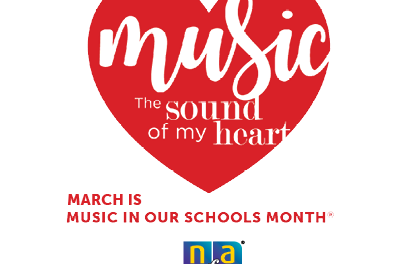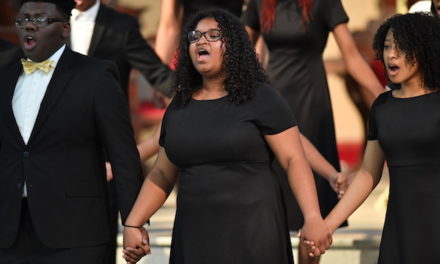
Originally posted on NAfME.org
Each year, your music program produces a new class of graduates. For four years, those students have dedicated their time, talents, and treasure to their music education. But their diploma doesn’t mean that their time — or their parents’ time — with your program has to end. By investing a bit of thought and effort into your alumni, you’ll reap the benefits of building a large, supportive community around your program. Don’t let these valuable relationships slip through your fingers!
Why Bother?
One more responsibility to juggle, one more hat to wear. If you build it right, though, your alumni efforts can be self-sustaining — and mostly hands-off for you! The reason your alumni and their parents are so valuable to your program is because they GET IT. They know exactly what you do and why you do it, and why music education is so important. They’ve been through it.
After four years, they know, like, trust, and thoroughly understand the value of music education, specifically your music program.
After four years, they’ve stored a lot of knowledge about your program that often isn’t tapped efficiently — or at all.
After four years, they are already in the HABIT of contributing to your organization. Take advantage of that! Habits can be a strong ally in this situation.
After four years, they’ve developed a strong emotional connection to your program and the people in it. Don’t be afraid to tug on those heartstrings to get your alumni to help bolster your music program for years to come!
Getting Started
The first step is finding a volunteer or two to spearhead these efforts. Key skills include talking to other alumni (you want someone who can really work a room!), as well as handling administrative and communications tasks. Once you’ve found the right people for the job, here’s where to start.
Make a Note of It
As soon as possible, start collecting data. That may sound cold and clinical, but it’s the first step to maintaining a warm relationship with your alums. You can‘t have a relationship if you can’t find these people, so start to build systems to collect this information so you can keep in touch with them from here on out.
There are a lot of options available to you, including sophisticated donor management systems, but you can start with a plain old spreadsheet. Here are some of the fields you should include:
- Name
- Address
- Phone (home & mobile for optional text updates from a service like https://www.remind.com/)
- Email
Whether they’re students of your program, or parents (they might be both, so build in that possibility from the beginning!) - Years attended or active and/or their graduation year
- Instrument(s) played: this is helpful if you ever recruit an alumni band, or for fundraising (see below)
You may also want to make note of the following information:
Who’s your employer?
Many employers provide matching funds when an employee donates to a nonprofit. Or if your program solicits sponsorships, having someone with contacts “on the inside” can be invaluable to creating the perfect partnership.
How would you like to be contacted?
This is a great way to find out what channels your alumni prefer to use, so be sure to ask how they would like to be contacted by you, and how often they’d like to hear from you. Any unwanted communications are considered spam by the recipient, and you don’t want your information to fall into that category. Some may want only emails, while others may want to hear from you on Tumblr or check out YouTube videos, and yet another might want to receive a text message anytime your group performs nearby.
Make It Frictionless
When you collect this information, make it easy on your alumni. If it’s difficult, or a pain to do, people won’t do it, even if they fully support what you do. For this year’s graduates, it might just mean exporting their existing data into your new spreadsheet. For others, it might mean having them handwrite their information onto a form at your next performance or event. It might be you calling the last phone number you have for them, and asking them for this information over the phone. Or perhaps it’s a link shared on social media to a web page where they can fill out the information online.
What Will You Say, and When?
Based on the information you collect and the resources available to you, decide how you’ll continue to communicate with your alumni going forward. Email? Social media? Text message? Snail mail? Phone?
Whichever methods you choose, set up a plan to communicate regularly and consistently. Maybe a quarterly newsletter is sufficient. Or perhaps during marching season when so much is happening, your alumni would like monthly or even weekly updates!
Ask and You Shall Receive
Once you set up your communications plan, find ways to keep your alumni involved. Continue to ask them for their contributions on a regular basis. That might be as simple as asking them to post a photo for you to feature on #ThrowbackThursday, or to spend time training a new parent on the volunteer position that they used to hold.
If they’re local, have them actively advocate for your music program. The word of a tax-paying alum goes a long way in front of the school board. Alumni are close enough to your program to be credible sources, but not so close that people will assume that they will benefit directly from the program. This is what makes them perfect advocates. In fact, you should consider encouraging your alumni to run for school board!
Sometimes parents are so grateful for what music did for their own child that they’d continue to sacrifice financially so that another child can also benefit from your music program. They could sponsor a student individually, contribute toward expenses, or spearhead a scholarship program. Have your alumni contribute toward giving students the same great experience that they had in your program. In return, invite them to attend your performances, or drop in on a rehearsal.
Loyalty Can Pay Off
Think of ways that you can utilize the loyalty of your alumni for the benefit of your music program. Consider challenging your crosstown rival.
We all know that there are often friendly section rivalries, so take advantage of those as well. Challenge the brass to take on the woodwinds, or high brass against low brass. See which section can raise the most money in exchange for bragging rights. Or if you know you need a new sousaphone, for example, you may want to target low brass alumni who would be more likely to contribute to that fundraising campaign.
Make It Easy and Fun!
Consider providing a menu of donation opportunities. It’s so much more satisfying to donate when donors know exactly what their dollars will buy. For example, a $10 donation buys an incoming freshman a band camp t-shirt. Fifty bucks buys five cans of spray paint for the props. Seventy-five dollars covers the cost of a tank of gas for the equipment truck. Or $1,000 pays for one school bus for a local competition.
Let Them Get Their Hands Dirty
So many involved alumni parents feel heartbroken when their child is leaving the program, and they may feel like they’ll have to give up volunteering for you. Let them know that they can (and should!) continue to contribute and volunteer.
Have former students come back and volunteer. You spent four long years showing them how it’s done, so let them pay it forward. They can be teaching assistants during band camp, or they can fill in volunteer spots at events while current parents watch their students perform.
(IMPORTANT SIDE NOTE: Please make sure not to allow alumni to crowd out current parents from volunteer opportunities. While it’s tempting to go with the long-time volunteer that’s tried, true and reliable, choosing an alumni parent to volunteer over current parents just teaches an entire generation of current parents that their help isn’t needed. To ensure the strength of your program now and for years to come, you need to engage as many current and alumni parents and volunteers as possible!)




